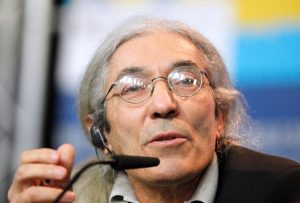ALGIERS, Algeria (AP) — Algeria ’s President Abdelmadjid Tebboune granted a humanitarian pardon to the French-Algerian novelist Boualem Sansal Wednesday, releasing him after a yearlong imprisonment that sparked widespread criticism.
French President Emmanuel Macron welcomed the move on X, writing: “Boualem Sansal is free and soon to return. My deep gratitude goes to (German) President Steinmeier for our fruitful cooperation. I thank President Tebboune for this gesture of humanity.”
The 76-year-old author — whose works have been critical of Islam, colonialism and contemporary Algeria’s leaders — had been imprisoned since being arrested at the airport in Algiers in November 2024 upon his return from France.
He was convicted of undermining national unity and insulting public institutions and was sentenced to five years in prison under Algeria’s anti-terrorism laws in March.
Sansal has cancer, and his attorney said his health was deteriorating.
Sansal’s case became a flashpoint as tensions spiked between France and Algeria last year. French politicians including Macron urged authorities to free him. The European Parliament passed a resolution condemning his arrest. Literary colleagues, including Kamel Daoud, Salman Rushdie and PEN International, published open letters calling for his release.
It was ultimately an appeal from Germany that led Tebboune to act. Two days after German President Frank-Walter Steinmeier asked for Sansal to be pardoned, citing his age and health problems, Tebboune cited humanitarian grounds and Germany’s request in issuing the pardon.
In a statement on Wednesday, Tebboune’s office said Germany would accept responsibility for him and provide medical treatment, without specifying where that would be.
Sansal’s problems with Algerian authorities date back to October 2024. In an interview with the right-wing French media outlet Frontieres he questioned Algeria’s current borders, arguing that France had redrawn them during the colonial period to include lands that once belonged to Morocco.
The remarks came months after France infuriated Algeria by backing Morocco’s plan to maintain sovereignty over the disputed Western Sahara. Sansal was arrested the following month and later lambasted by the president in a speech to Algeria’s parliament.
Algeria ignored pleas from French politicians to release Sansal. French commentators described his imprisonment as a political lever deployed against Paris.
French Prime Minister Sébastien Lecornu on Wednesday said France’s government was relieved that Sansal had been released.
“We hope he’ll be able to rejoin his loved ones as soon as possible and receive treatment,” Lecornu told an applauding audience of lawmakers at the National Assembly.
Sansal’s imprisonment also came during heightened censorship in Algeria. Since pro-democracy protesters forced the military to oust longtime president Abdelaziz Bouteflika in 2019, authorities have clamped down on dissent. Hundreds — including journalists, activists, poets and lawyers — have been detained or imprisoned for speech-related offenses, according to Amnesty International and Algeria’s National Committee for the Liberation of Detainees.
Before his arrest, Sansal’s work faced bans from Algerian authorities but he regularly traveled between Paris and Algiers. His books, written in French, are not widely read in Algeria. However, he has a large following in France, where his novels criticizing the role of Islam in society have endeared him to both the literary elite and far-right leaders.
His novel “2084: The End of the World” won the France’s Grand Prix du Roman in 2015.

